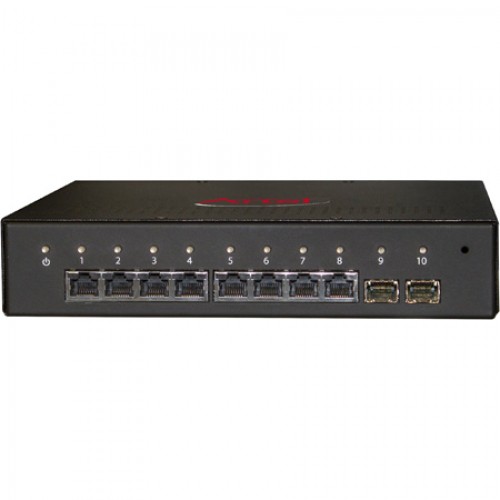Artel 2800-EQ200-BOM ARG 10100 QUARRA PTP Switch-1Gbps
- Brands Artel Video Systems
- Product Code:ARTL-2800EQ200BM
- Availability:In Stock
-
$2,295.00
Artel's Quarra range of IP PTP (Precision Time Protocol) switches is designed for Carrier Class applications where accurate timing and control is required. These switches are aimed at the professional markets of Audio/Video Broadcast, Defense & Security, Finance, Utilities, Telecom, and Enterprise IT.
Designed as either a standard 1RU rackmount unit with dual power supplies, or a half-width 1RU unit with a single power supply, the switches are available in several configurations of Gigabit and 10 Gigabit interfaces supporting a best in class layer 2 IEEE 1588v2 algorithm. A 1pps external reference input from GPS is included as standard and options include an internal layer 1 Synchronous Ethernet module.
Features:
- SMPTE ST 2059-2 & ST 2110-10 Ethernet Switching
- RAVENNA AES67 Ethernet Switching
- Industry's most Accurate IEEE 1588 Timing & Synchronization for nanosecond accurate timing
- Synchronous (L1) Ethernet, Master, and Slave. Precision clock timing using DSPLL technology
- 1pps reference. Network wide synchronization using IEEE1588 or SyncE
- SMPTE Standards-based Timing: ST 2110-10 System Timing and Definition; ST 2059-2 SMPTE Profile for Use of IEEE-1588 Precision Time Protocol in Professional Broadcast Applications
- RAVENNA AES67 approved
- IEEE802.1 AVB
- Full management from Web GUI or command line interface. No training required-units can be quickly and easily configured
- Live Video/Audio broadcast/production over IP utilizing IEEE 1588 timing, QoS, and Multicast filtering
- Broadcast DTT/DTV IP distribution, utilizing IEEE 1588 and SyncE timing to replace or backup GPS timing at base stations
- Telecoms networks, providing high level of network timing
- Financial/trading networks, utilizing our IEEE1588 precise nanosecond time synchronization
Specifications:
-
Carrier Ethernet
- Layer-2 IEEE 1588v2 : Precision Time Protocol (PTP) timing and synchronization
- IEEE 802.1ad : Provider bridging (VLAN Q-in-Q) switch - 8 MACs, 4K VLANs
- Per queue MEF E-LINE or per port MEF E-LAN, E-TREEService Points - Per port per queue Dual Leaky Bucket Service Policers with PCP or DSCP remarking per Service port
- OAM Hardware for generating CCM messages, CCM checking is done by software - Software of OAM and protection switching
- EPS and ERPS Protection Switching
- TCAM-based VLAN classification and translation with pattern matching against Layer-2 through Layer-4 information
- Up to 256 QoS and VLAN TCAM entries
- Eight QoS queues per port with strict or deficit weighted round-robin scheduling (DWRR)
- DSCP translation, both ingress and/or egress
- DSCP remarking based on QoS and VLAN TCAM entries
- VLAN (PCP, DEI and VID) translation, both ingress and egress
- Per-queue, per-port policing and shaping, programmable in steps of 100 kbps
- Per-flow policing through TCAM-based pattern matching, Up to 256 policers
- Full-duplex flow control (IEEE 802.3x) and half-duplex backpressure, symmetric and asymmetric
Layer 2 Switch - Port mirroring
- Port-based access control
- IEEE 802.3ad: Link aggregation
- IEEE 802.1x: Network Access Control
- IEEE 802.1w: Rapid Spanning Tree Protocol
- IEEE 802.1s: Multiple Spanning Tree Protocol
- Simple Network Management Protocol (SNMP)
- Independent and shared VLAN learning
- 256 VLAN egress tagging TCAM entries
- Link aggregation traffic distribution is programmable and based on Layer-2 through Layer-4 information
- Basic Switching - Forwarding, address learning and address aging
- VLAN IEEE 802.1Q (4,096 VLAN's) - Push / pop / translate up to two VLAN tags; translation in ingress and / or egress
- 8,192 MAC addresses. Including Generic Attribute Registration Protocol (GARP)
- Wire-speed hardware-based learning and CPU-based learning configurable per port
Multicast - 8K Layer-2 Multicast group addresses with 64 port masks
- 8K IPv4/IPv6 multicast groups
- Internet Group Management Protocol v2 & v3
- Multicast Listener Discovery (MLDv1)
- Multicast Listener Discovery (MLDv2) with source specific multicast forwarding
- Static tagging options per Service Point
Quality of Service

